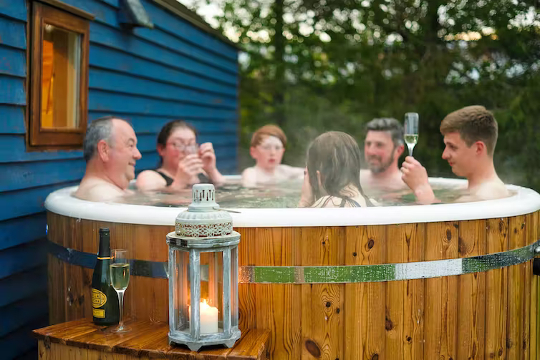
Communal bathing can get pretty disgusting. monic zrivoic/Shutterstock
For many centuries we have bathed in communal waters. Sometimes for cleanliness but more often for pleasure. Indeed, in ancient Greece, baths were taken in freshwater, or sometimes the sea – which was thought of as a sacred place dedicated to local gods and so was considered an act of worship.
But it was the Romans who created state-sponsored aqueducts to allow for large-scale public baths. These were mainly used for relaxation but also for more private pleasures, too. Yes, the public baths were often where Romans did the dirty deed - sometimes with their bath attendant slaves.
Two millennia on, we’re still attracted to bathing communally, though many people now have their own hot tub or Jacuzzi – sales of which went up massively during the pandemic.
For those that don’t have their own, there’s always the local gym or spa. And many hospitals also feature one too. This is because Jacuzzis are often used therapeutically for relieving and treating joint inflammation in rheumatoid and osteoarthritis patients. Indeed, in many ways Jacuzzi bathing is regarded as a luxury treat experience – one that’s both relaxing and rejuvenating.
Get The Latest By Email
The warmth of the water within the Jacuzzi naturally widens blood vessels, which helps our muscles to relax and eases sore joints. As well as being physically comforting, a sense of psychological wellbeing may also be created by the buoyant warm water and the companionship of those who share the bathing experience.
Bacteria, viruses and fungi
But it’s also worth bearing in mind that when we enter the waters of a Jacuzzi whatever we have on our skin we deposit into the warm water swirling around us. This includes the 100mg or so of faeces that is usually present between our buttock cheeks. This means that while you’re relaxing in the warm water, you’ll likely breathe in or swallow your Jacuzzi partner’s body’s bacteria, viruses and fungi.
The more people in the Jacuzzi, the higher the levels of faeces and sweat shed into the water (and urine if anyone has peed in the water). And these bodily deposits can be used by the bacteria as direct nutrients.

‘I just love it when we share faecal matter together.’ DGLimages/Alamy Stock Photo
As Jacuzzi owners are advised to change the water in their baths only around every three months, bacteria will grow. For microbiological safety, most Jacuzzis that recirculate water have microbe-removing filters and water is treated with microbicides (which kill germs) such as chlorine, bromine, or other disinfectants to control bacterial numbers.
Such chemicals are toxic and cause skin and eye irritation. This is why Jacuzzi users are advised to shower after bathing (and should also shower before, too). The temperature of the water within a Jacuzzi (around 104°F or 40°C can also cause potentially serious health problems such as core overheating which can lead to feeling faint or even loss of consciousness and potentially drowning.
This is especially the case for pregnant women and children, along with people with underlying health conditions, who should always check with their GP before using a Jacuzzi. This is why most sessions are advised to last no more than around 15 minutes and should be supervised.
Dirty or filthy?
While personal Jacuzzis may be relatively safe microbiologically, public (hotel or spa) Jacuzzis can potentially be very high in infection-causing bacteria (germs), particularly if water is recycled.
The root problem is poor public compliance with personal hygiene guidelines and inadequate water treatment maintenance. Improperly maintained public Jacuzzis can lead to outbreaks of infections by human-associated bacteria which survive well in water.
These include E.coli, Staphylococcus aureus, Pseudomonas aeruginosa and Legionella pneumoniae. These Jacuzzi pathogens can cause gut infections, diarrhoea, septicaemia, skin infections, urinary tract infections and respiratory infections, including Legionnaires’ disease.
Legionella bacteria are particularly found in the water droplets within the Jacuzzi steam and inhaling the contaminated steam could lead to the development of life-threatening pneumonia.
Indeed, the infection risk from Jacuzzis is so significant that in the US, the Centers for Disease Control has released official advice on how to prevent this.
So if you do still want to enjoy a hot tub or a Jacuzzi, is there a way of telling if it’s safe or not? There are some clear signs of a germ-filled Jacuzzi. When urine and other body fluids such as sweat mixes with the chlorine used to disinfect Jacuzzi waters it creates an irritant, a pungent chemical called chloramine, which is what causes sore eyes when swimming in public pools.
The more bathers that deposit their bodily fluids the stronger the smell of the chloramine (which smells a bit like bleach) and the greater the likelihood that the spa or hotel Jacuzzi has low levels of disinfectant and high levels of bacteria. So if the Jacuzzi is strong smelling, the chances are it may be unsafe to use – even if the waters look clean and clear, though it’s also worth noting that the water does become murkier the longer it goes without chemicals.![]()
About The Author
Primrose Freestone, Senior Lecturer in Clinical Microbiology, University of Leicester
This article is republished from The Conversation under a Creative Commons license. Read the original article.
books_health









